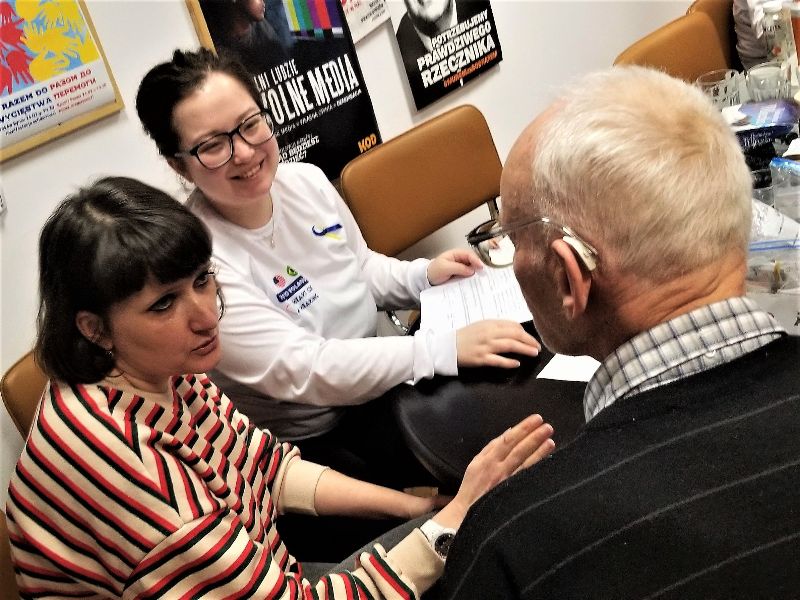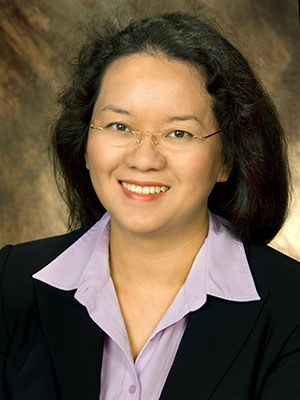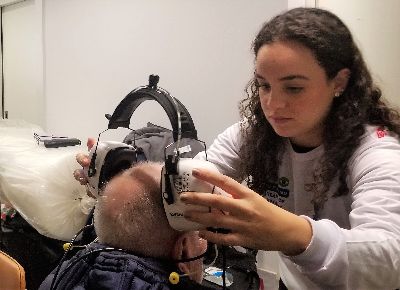|
www.HealthyHearing.com |
Among Ukrainian refugees, ravages of war often include hearing lossThe need for help is 'astounding,' noted a volunteer who provided hearing care
Contributed by Madeleine Burry For Ukrainian refugees, hearing damage hasn't garnered many headlines. Yet, it is a real possibility: Missiles, rockets, and bombs can damage the delicate inner ear anatomy and auditory nerves, leading to not just brain injuries but also hearing loss and tinnitus. Then, of course, there’s the lost or damaged hearing aids that can occur in the general chaos of fleeing one’s home. The need for help for this refugee population borders on overwhelming, says one volunteer who helped treat patients with hearing loss, tinnitus, and other auditory problems on a recent trip to Poland. An 'astounding' number of refugees with hearing lossIn early 2022, audiologist King Chung, PhD, CCC-A, was planning a visit to Poland for a conference as well as potential collaboration with a Polish professor who’d previously visited the NIU campus. 
Poland. When the war began in February, “[I thought,] Oh, I have to do something about it. Because I'm so mad about it,” she says. Good deeds are powered by passionate volunteers—and logistical support. At first, Chung struggled to connect with refugees, but her emails led her to the Jewish Community Center (JCC) in Kraków. The organization is dedicated to rebuilding Jewish life in the city, and since the start of the war, has offered support, including housing, supply distribution, language lessons, and more, to Ukrainians via the Ukraine Crisis Appeal. (The JCC offers aid to all, regardless of religion.) The JCC organized a hearing assessment event for refugees, which took place in a hotel Thanksgiving 2022. Chung attended along with fellow volunteers from Northern Illinois University and Federal University of Rio Grande do Norte in Brazil. “We tested about 150 people,” recalls Chung, who is also the program director of audiology at the School of Allied Health and Communicative Disorders at NIU. Based on the results, nearly half of the Ukrainian refugees—70—had hearing loss. Many also needed professional ear cleaning to remove earwax. Some refugees had injuries that were a direct result of war, such as hearing loss, tinnitus and perforated ear drums following the shockwaves of bombing. Chung and her fellow volunteers had to be quite sensitive during assessments. “We will just ask them, ‘Oh, when did you find out you have hearing loss and what happened?’’ Chung notes—that is, they wouldn’t ask directly, “Is your hearing loss due to the war?” since that might trigger an agony of grief. Even without asking direct questions, Chung estimates that for about 30 percent of the people she saw with hearing loss, it was due to the war. Of course, since the JCC had put out the call for hearing assessment, this was not a population test, but rather, a self-selected group, where you could expect more people to have hearing problems. Still, Chung describes herself as “astounded” by the volume of people with hearing loss. 'Oh my gosh, I can finally hear'In March 2023, the NIU student and alum volunteers returned, along with additional volunteers from Rush University, and two Brazilian universities, the Federal University of Paraiba and the University of São Paolo. With so much hearing loss present, their goal was to fit hearing aids. Some people that Chung and the team tested had preexisting conditions or other high-stress circumstances. 
organize a hearing clinic to assist refugees. For instance, one 20-year-old woman left her hearing aids at school when her family fled the country. During the evaluation, the woman didn't want to be touched, Chung says. After being fitted with hearing aids, "she was crying, and then she said 'Oh my gosh, I can finally hear,'" Chung recalls. “It was very, very touching, because she was just living in silence for the whole year." Those were not the only tears Chung encountered. She was concerned initially to encounter a middle-aged woman on the verge of tears during the testing and hearing aid fitting process, but the woman told her she was fine. “She was just overwhelmed by the kindness,” Chung recalls. War is ruinous to hearingHearing problems account for 10 percent of the disabilities experienced by veterans deployed to combat areas, per the U.S. Department of Veteran Affairs. (Tinnitus is a common cause of veterans’ seeking disability compensation.) But of course, it is not just the military that experiences the effects of war. For people in Ukraine, and for Ukrainian refugees, war can affect hearing in a variety of ways:
Powering efforts to helpPassionate volunteers make a difference. Chung is already planning another return visit to Poland in the summer of 2023, where there are more than 1.5 million Ukrainian refugees as of March 2023, according to the UN Refugee Agency. 
Poland to provide hearing care to Ukrainian refugees. Nonprofit organizations play an essential role connecting helpers to refugees. So too do donations. Hearing aids are transformative for people with hearing loss, enabling communication and connection. But the full cost of hearing aids is not typically covered by healthcare benefits in Poland. Chung recalls that one woman fitted for hearing aids was shocked when she looked up their cost—they were rechargeable digital hearing aids that had previously been used for a few months in a research project. “She came back with a cake,” Chung recalls. After Chung wrote about her experience in Poland in Hearing Journal, audiology and hearing solutions company ReSound donated more than 100 new and lightly used hearing aids, Oaktree Products and MedRx donated diagnostic and fitting supplies. How to helpYou too can help—here’s how:
Madeleine Burry
Related Help Pages:
Hearing loss Causes Noise-induced hearing loss Hearing aids Fitting Children's hearing aids
|
Featured clinics near me
Earzlink Hearing Care - Reynoldsburg
7668 Slate Ridge Blvd
Reynoldsburg, OH 43068

Find a clinic
We have more hearing clinic reviews than any other site!


 Madeleine Burry is a Brooklyn-based freelance writer and editor. She's written about health for several online publications, including Women's Health, Prevention, Health, Livestrong and Good Housekeeping. You can follow her on Twitter @lovelanewest.
Madeleine Burry is a Brooklyn-based freelance writer and editor. She's written about health for several online publications, including Women's Health, Prevention, Health, Livestrong and Good Housekeeping. You can follow her on Twitter @lovelanewest.